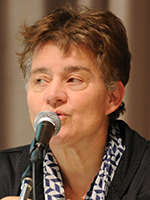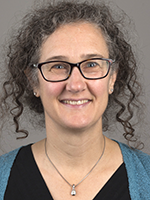Meet the Candidates
Two Vice-President positions are available: Europe and North America. You will vote for one candidate in each region. Below are details about the candidates and a link to their candidate statements. This information has been provided by the candidates to assist members while deciding how to cast their vote.
You must be an IEPA member to vote. The Voting Deadline is July 6, 2018.
Voting for Vice-President Elect has Closed.
IEPA Europe

Philippe Conus
Philippe Conus is Professor of Psychiatry at the University of Lausanne.
Early intervention in psychiatric disorders has become a widespread concept and it has generated fantastic research and clinical developments. Yet, it is by far not implanted everywhere and still needs a lot of advocacy and support in order to remain on the agenda of deciders. In addition, if the strategies developed for psychosis have expanded to other domains of psychiatry, there is much work remaining before it can be applied in clinical settings.
IEPA Early Intervention in Mental Health has played a key role in coordinating forces around the world so far and it has an important role to play in order for these progress to continue. Moreover, the impact of the early intervention movement can go beyond creating science and clinical strategies: it also has the potential to change the way people look at psychiatric disorders and hence to reduce the stigma patients and their families are facing, by proposing a less pessimistic and more ambitious approach to mental illness.
I have been active as a clinician and researcher in early intervention since year 2000 and have been part of the board over the last 4 years. If I am chosen as president elect, I will put all my energy in pursuing the work initiated by others and in expanding its impact, in order to promote this treatment and research philosophy even further.

Paul French
Paul French is an Honorary Professor at Liverpool University and Clinical Lead for Early Intervention in Psychosis services in Manchester and Cheshire, UK.
I would like to be considered for a board position within the IEPA and feel that my extensive and broad experience in the field would make me an ideal candidate.
I have been involved with the development of research and evaluation in early intervention in psychosis for a number of years. This has included extensive research in the area of emerging psychosis and At Risk Mental States and the development of treatment strategies to support these individuals and more latterly family based interventions. More recently I have been involved with studies targeting social disability in a trans-diagnostic approach with the aim of developing specific interventions to minimise this.
I have supported the development of clinical services, locally, regionally and nationally across England for a number of years and was central to the Expert Reference Group that established the Access and Waiting Times Standard for EIP. I continue to provide clinical leadership nationally in this area in order to support the uptake of these standards. I have recently been appointed as joint National Clinical Advisor within the Royal College of Psychiatry with regard to the EIP National Clinical Audit of Psychosis. Furthermore, I have excellent international links and collaborations.
I would welcome the opportunity to help promote the vital work of the IEPA, supporting existing members whilst looking for opportunities to develop and expand the membership.
As an added bonus I feel that as a mental health nurse I would bring a wider and more diverse multidisciplinary perspective to the board which to date has been predominantly made up of Psychiatry and Psychology colleagues.
I believe that my experience to date across research, policy and clinical services provide me with an excellent skill set to work at board level within the IEPA and would welcome the opportunity to be considered for this post.

Merete Nordentoft
Merete Nordentoft is Professor in Psychiatry at the University of Copenhagen.
I am Professor in Psychiatry; University of Copenhagen and I have been a member of IEPA since 1998. I think IEPA is one of the most important and successful international associations in mental health. IEPA has improved the lives for many young people in early phases of psychoses, and it has had a tremendous impact on how services for young people are organized all over the world. It has changed the image of psychiatry to be more user friendly and less stigmatizing. We have a strong scientific background for our work, and we should continue to promote science and increase the evidence base in order to improve the lives for young people with mental health problems and their families.
I have played a leading role in developing and implementing early intervention services in Denmark. My areas of expertise are epidemiology, suicidal behavior, psychopathology and early intervention in psychosis. I led the process from research to implementation of early intervention services all over Denmark. I have worked with suicide prevention at a national level since 1997 and together with a group of epidemiologists from Nordic countries, I have demonstrated that life expectancy for people with schizophrenia is 15 to 20 years shorter than in the general population. In 2012 I initiated the Danish High Risk and Resilience Study VIA 7 -a representative cohort study of 522 7-year-old children with 0, 1, or 2 parents with schizophrenia or bipolar disorder, which will be followed into adulthood. I have received the Golden Scalpel Award, Global Excellence in Health, the Richard Wyatt Award and the Marie, August Krogh Award, and the honorific award from Danish Medical Association. In 2017, I was identified as one of the one percent most cited researchers in the period 2005-2015.
I have served as president of IEPA from 2012 to 2014, and I will like to continue to be involved in the association as vice president of Europe. In collaboration with the rest of the board, I will focus on implementation of early intervention services for young people with psychotic disorders, services for people with milder disturbances of thought and perception (UHR) and also services for people with other mental disorders.
IEPA North America

Chi Cheng
Chi Cheng is Child & Adolescent, Youth Psychiatrist & Assistant Professor in Psychiatry Section, Clinical Sciences at the Northern Ontario School of Medicine.
I have been a member of IEPA since 2006 and worked in early psychosis intervention for over 12 years. In that time, I have faced the challenges of delivering specialized mental health care to disadvantaged populations across a vast geographic area in northern Canada. The experience has been rewarding and humbling, and I have immense appreciation for the challenges that face my clients, families and communities.
I am running for VP (North America) for the IEPA Board because I want to contribute to IEPA’s commitment to exceptional standards, quality care and early intervention to the full spectrum of mental illnesses. My practice has both clinical and research functions. Over time, my clinical practice has evolved, and increasingly encompasses early intervention across the full spectrum of youth mental health. My research focus is in the intersection of youth mental health, vulnerable populations and rural health services. I am on faculty at the Northern Ontario School of Medicine, as Researcher and Child, Adolescent and Youth Psychiatrist.
I have valued the community of the IEPA, and the connection to like-minded people, who believe in improved services for youth experiencing mental illness. This network has decreased the isolation of practicing in rural Canada, and I have valued the generosity of members of IEPA in sharing resources across the globe. I have experience as Co-Chair of the Early Psychosis Intervention Ontario Network (EPION), a provincial network consisting of over 50 programs, individuals who have received services, their families and caregivers. My time with EPION was truly inspiring; I continue to benefit from all that I have learned. I would like to continue my work in youth mental health by contributing to the network of IEPA, and bring to the IEPA Board, my experience as a clinician, researcher and network-leader.

Kristen Woodberry
Kristen Woodberry is Assistant Professor of Psychology at Harvard Medical School and Director of the Program for Psychosocial Protective Mechanisms at Beth Israel Deaconess Medical Center, Massachusetts, USA.
It is a great honor to be nominated for a position on the IEPA board as VP for North America. Having worked for over 25 years as a clinical social worker and psychologist and in a range of United States child and adult psychiatry and psychosis research settings, I would bring to this role an appreciation for the unique challenges of early intervention programs in the United States, and welcome input and requests from colleagues in Canada, and Mexico.
Although the sudden loss of my longtime mentor Larry Seidman has hit our field hard, I am committed to carrying forward his spirit of international collaboration. It has been an honor to step in as co-convenor of the 2018 IEPA conference, “Broadening the Scope” in Boston Massachusetts and to gain a hands-on appreciation for the expanding role of IEPA. We are looking forward to increased participation by North American clinicians and researchers. Increased focus on early psychosis and early intervention/prevention programming at the national level in the United States offers a “critical period” for the development of new collaborations, longitudinal studies, treatment implementation, component and cost effectiveness analyses, and public education. I am eager to leverage the resources of the IEPA community to catalyze mental health system reform. Making prevention and early intervention services sustainable, particularly in North America, is essential to this.
Finally, my recent research has focused on the use of technology to engage adolescents and young adults and to better understand heterogeneity in developmental trajectories. If elected, I am interested in seeking ways to better integrate developmental psychopathology and innovative technologies into early intervention science and practice. I would work to recruit more developmental scientists, child and adolescent clinicians, and technology experts into the IEPA community.
Voting for Vice-President Elect has Closed.